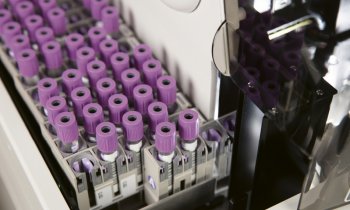© Анна Ковальчук – stock.adobe.com
News • Retinal functional impairments as biomarkers
Eye exam shows potential for early detection of Parkinson's disease
Could it be possible to diagnose Parkinson's disease with the help of a simple retinal exam? The idea should be seriously considered, according to a new study.
The study was published in the journal Neurobiology of Disease by researchers from Université Laval who discovered that the retina of people with Parkinson's disease responds differently to light stimuli than that of healthy people.
Parkinson's disease is usually diagnosed when a person consults a doctor because of motor problems such as tremors. “By then, the disease has been present for several years and the affected neurons are already engaged in an irreversible degenerative process. That's why it's important to find biomarkers that detect Parkinson's at an early stage of the disease”, explains study leader Martin Lévesque, professor at Université Laval's Faculty of Medicine and researcher at CERVO Brain Research Centre in Québec City. “The retina is a direct extension of the central nervous system and, consequently, offers a non-invasive way of exploring the brain”, continues the researcher. “An unusual response of the retina to light stimuli could be indicative of a pathology affecting the brain.”
This approach could also be used to monitor the progression of the disease, as well as the effectiveness of interventions offered to patients
Martin Lévesque
To explore this avenue, his research team recruited 20 people who had been diagnosed with Parkinson's for less than 5 years. “We placed an electrode on each participant's lower eyelid and recorded their retinal response to a series of flashes of different intensity, frequency and color. We did the same with people of the same age, but in good health. The results we obtained for people with Parkinson's had a distinct signature from those in the control group,” explains Professor Lévesque.
The research team carried out similar tests in transgenic mice overexpressing a human protein associated with Parkinson's disease. “We used young mice in which no motor signs of the disease were yet observable. Once again, we obtained different responses in Parkinson's model animals. This suggests that the functional manifestations of Parkinson's could be detected at an early stage of the disease by retinal examination”, sums up Martin Lévesque.
Parkinson's disease occurs most often in people over the age of 60. “We could offer a functional retinal exam from the age of 50,” continues Lévesque. “By detecting the disease early, we could offer interventions that prevent the degeneration of the neurons involved in Parkinson’s. This approach could also be used to monitor the progression of the disease, as well as the effectiveness of interventions offered to patients.”
The study’s first author is doctoral student Victoria Soto Linan. The coauthors are Véronique Rioux, Modesto Peralta III, Nicolas Dupré, Marc Hébert and Martin Lévesque.
Source: Université Laval
06.05.2025









